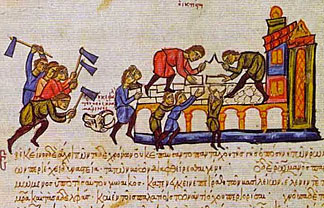Yannis Smarnakis
Lecturer in Social and Cultural History of Byzantium at the University
of Aegean / Greece.
Eleni Tounta
Assistant Professor in Medieval History at the Aristotle University
of Thessaloniki / Greece.
Thessaloniki during the Zealots’ Revolt (1342-1350):
Political Violence, Rituals
and the Transformations of the Urban Space

During the 1340’s the conflict for the byzantine throne between the powerful families of Palaiologoi and Kantakouzenoi spread to Thessaloniki. In this city, the political faction of the Zealots, initially supporters of the emperor John V Palaiolologos, gradually developed their own political program to hold dominion over Thessaloniki, aiming for the city’s autonomy from the imperial power.
In this paper we focus on the processes through which the Zealots constructed and performed their political identity as they were violently interacting with their opponents. Particularly, the symbolical violence hold a dominant role within the faction’s political practices, cultivating ties among its members, setting borders between political “orthodoxy” and heresy, and defining urban political life as a field of violent controversy. We also examine the ways the Zealots re-conceptualized urban space through their strategies of imposing political dominion in disputed urban zones of a great symbolical significance, such as the market of the city and the area around St Demetrius’s church. Finally we attempt a comparison between the zealot revolt and similar contemporaneous urban upheavals in Western Europe thus placing the case study of Thessaloniki in a broader European context.
Γιάννης Σμαρνάκης, Πανεπιστήμιο Αιγαίου
Ελένη Τούντα, Αριστοτέλειο Πανεπιστήμιο Θεσσαλονίκης
Η Θεσσαλονίκη κατά τη διάρκεια της εξέγερσης των Ζηλωτών (1342-1350). Πολιτική βία, τελετουργίες
και μετασχηματισμοί του αστικού χώρου

Στη δεκαετία του 1340 η διαμάχη για το βυζαντινό θρόνο ανάμεσα στις ισχυρές αριστοκρατικές οικογένειες των Παλαιολόγων και των Καντακουζηνών μεταφέρθηκε και στη Θεσσαλονίκη. Εδώ οι Ζηλωτές, υποστηρικτές αρχικά του Ιωάννη Ε΄ Παλαιολόγου, σταδιακά διαμόρφωσαν ένα ιδιότυπο πολιτικό πρόγραμμα κυριαρχίας στην πόλη στοχεύοντας τελικά στην αυτονόμηση της Θεσσαλονίκης από την αυτοκρατορική εξουσία.
Στην ανακοίνωση εστιάζουμε στις διαδικασίες συγκρότησης και επιτέλεσης της πολιτικής ταυτότητας των Ζηλωτών μέσα από τη σύγκρουση με τους αντιπάλους τους. Ειδικά η συμβολική βία διαδραμάτιζε σημαντικό ρόλο στις πρακτικές της ομάδας καλλιεργώντας δεσμούς ανάμεσα στα μέλη της, χαράζοντας τα όρια μεταξύ πολιτικής «ορθοδοξίας» και «αίρεσης» και ορίζοντας την αστική πολιτική ζωή ως ένα πεδίο βίαιης αντιπαράθεσης.
Εξετάζουμε επίσης τις ανασημασιοδοτήσεις του αστικού χώρου, μέσα από τις στρατηγικές πολιτικής κυριαρχίας σε αμφισβητούμενες ζώνες με μεγάλη συμβολική σημασία, όπως η αγορά και η περιοχή του Αγίου Δημητρίου.
Τέλος η περίπτωση της Θεσσαλονίκης συγκρίνεται με ανάλογα παραδείγματα αστικών εξεγέρσεων στη δυτική Ευρώπη και αναλύεται σε ένα ευρύτερο ευρωπαϊκό νοηματοδοτικό πλαίσιο.